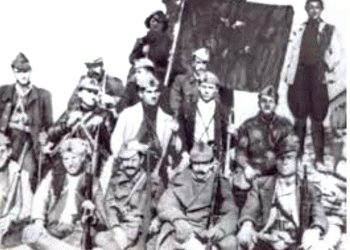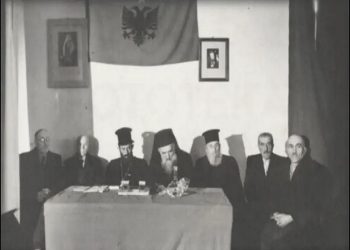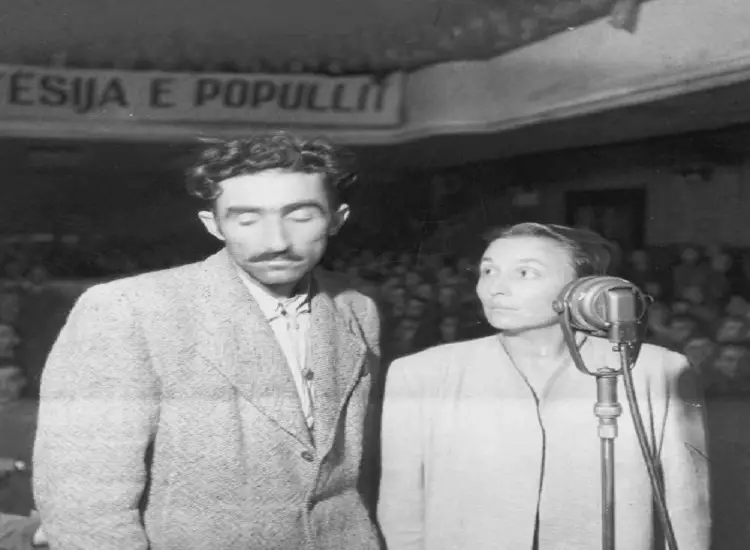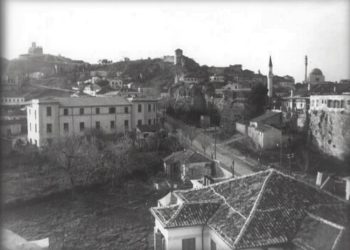Dashnor Kaloçi
Part thirty-seven
Memorie.al publishes a voluminous archival file issued by the institution of the Authority for Information of Former State Security Files, where there are hundreds of documents with the logo “Top secret” belonging to the former political prisoner, Xhavit Qesja, originally from the city of Kruja, whose family during the period of occupation of the country, 1939-1944, was closely associated with the Anti-Fascist Movement, being one of its main bases and made available all the wealth it had, as Xhavit was one of the first members of the Albanian Communist Party for the Kruja district, leading the Kruja-Ishëm partisan battalion and the 22nd Assault Brigade. Xhavit Qese’s political career after the end of the War, where he was appointed and served in senior positions in the Albanian Army, the apparatus of the Central Committee of the ALP, and several districts of the country, from where he was sent to study in the Soviet Union, where stayed until 1957, when he was announced to return to Albania urgently, after openly expressing his views in favor of the political line being pursued by the main Kremlin leader, Nikita Khrushchev, condemning the Stalin cult. Enver Hoxha’s conversation with Xhavit Qesen in his office in the Central Committee, where he sharply criticized him for the wrong views he had expressed during his studies in Moscow, urging him to reflect and make self-criticism, but Xhavit rejected the suggestion of the first secretary of the Albanian Labor Party, which caused him to no longer be allowed to go to the Soviet Union to complete his studies, but to be sent to work as deputy chairman of the Elbasan Executive Committee, from where a year later, he was expelled from the Party and exiled to Zvërnec Island, where the communist regime kept isolated some of the former senior party and state cadres whom he had condemned for their anti-party views. Xhavit Qesva’s long ordeal and persecution from 1957 to 1990, where he spent a full 32 years in prison and internment, being one of the few convicts in Burrell Prison who went on long hunger strikes in protest of the treatment and savage attitude that the communist regime of Enver Hoxha was holding towards him. The complete form, investigative and judicial file in charge of Xhavit Qeses, which is published for the first time by Memorie.al, which contains the documents of the former State Security that reflect the prosecution and wiretapping against him, the reports of Security collaborators with pseudonyms their correspondence with the letters he sent to the highest party and state instances, as well as the highest leaders of the ALP, until 1991 when he was released from prison!
Continued from the previous issue
The secret document with the plan of agency-operational measures approved by the chairman of the Burrel Branch of Internal Affairs, regarding the intensification of wiretapping and surveillance of the convict Xhavit Qesja, for his active processing 2 / A
APPROVED SECRET
CHAIRMAN OF THE BRANCH OF INTERNAL P. Single copy
BAJRAM NELI Burrel on 24.11.1981
MASH PLAN
AGENCY-OPERATIVE IN THE MANAGEMENT OF THE ACTIVE PROCESSING OBJECT 2 / A XHAVIT HAJDAR QESJA
On 24.11.1981 2 / A Xhavit Qesja was actively processed, with a tendency of agitation and hostile propaganda in the ranks of anti-party convicts. In order to detect, document, and discontinue its hostile activity, the following operational agency measures will be taken:
- The agent “Butrinti” will be directed with a line of conduct towards this object in order to find out:
- The aims of his hostile propaganda.
- Links with whom the object conducts hostile activity.
Performed by V. Kuka until 30.12.1981. Controls the Branch President.
- The agent “The Repentant” will be directed in parallel with the line of conduct to this object, who will solve the following tasks:
- If his hostile activity has an organized character, the role and function of each in this activity from his connections.
- From whom does he expect release from prison when he says that he does not expect it from Kulikov, and what are his hostile views in this regard? Perform P.Op. V. Kuka until the end of January 1982. Controlled by the Branch President.
- To specify, the data expressed by Kiço Ngjela, regarding a hostile organization made since 1971 in Zvërnec and to organize for this purpose a combination of T. O. between the object and the declarant.
Performed by P.Op. B. Budo and V. Kuka, until the end of February 1082. Controlled by the Branch President.
- To check through the ward command, the notes and translations of the object, correspondence and literature, in order to find out if he uses this channel to carry out hostile activity.
The analysis of this action plan should be done by July 30, 1982.
Operational Workshop Management Operational Workshop
Vehap Kuka Bekim Budo
Report-information of the Operational Worker, Vehap Kuka, with the data of the Security collaborator with the nickname “The Repentant”, regarding the conversations made by Xhavit Qesja and other convicts in Burrel prison
Received from the mailbox
Given by B.p. “The Repentant”
Burrel on 24.11.1981
Report dated 24.11.1981
He announces that recently Xhavit Qesja, got angry and does not talk to Gjergj Titan and it is not known why! But the main thing is that Gjergji himself is increasing his friendship with Todi and Fadil. In other conversations Xhaviti does not enter, but rarely talks to Agron and there gives a detached opinion about the orthography dictionary. Especially for what have many flaws in this regard in our press.
Thus, for example, there have been cases where he says that the well-known writer, author of “The Great Winter”, as a good writer, is not allowed to use words that are not needed in his writings. Or the press should not make such mistakes. Talks about not caring about books. They brought potatoes three times, but did not bring books, despite our constant interventions. This, says Xhaviti, shows that they do not like the book.
The Repentant
Clarification: Xhavit Qesja has been convicted twice for hostile anti-party activities, and so far we have in his charge only the general information file.
Assessment: The data has operative value, because it reveals the relations that the convict Xhavit Qesja has with the convict Gjergj Titani, his views regarding the dictionary of our orthography.
Operational measure: The data should be studied by the leadership of the Branch, printed in a copy and placed in the general file of information about Xhavit. Provide information on the Special Branch in the Ministry. Be used for the bulletin of the hostile slogans of the month.
Operational Workshop
Vehap Kuka
Report-information of the Operational Worker, Vehap Kuka, with the data of the Security collaborator with the nickname “Butrinti”, regarding the conversations made by Xhavit Qesja and the other convicts in Burrel prison and the political views of each of them
Received from the Operational Workshop
Vehap Kuka
Given by B.p. “Butrini”
Burrel on 9.12.1981
Report dated 9.12.1981
He announces that several years of experience of coexistence with convicted enemies of the party and the people, based on a set of factual data, such as direct conversations, statements made to each other, observations, etc. This makes it possible to ask the question of what distinguishes them from each other, what is the situation especially in “Mes”, what unites them from each other, and to give an answer both this and complete, because the process of recognition is clothed with secret and unlimited.
What unites these waists?!
- These are united by the common denominator of being enemies of the party and the people. Without exception these are enemies not only by qualifying as something special and general but based on evidence, facts, and attitudes. There is no need to go into the details of everyone’s crimes. We are emphasizing that this is where the opposition to the line and the laws begins.
Who openly (and these are not a few M. Çomo, B. Belishova, F. Paçrami, T. Lubonja, Gj. Marku, V. Gjino, Gj. Titani, and Xh. Qesja, do not accept the qualification as enemies of the people and the party Who quietly, and here I will list K. Ngjela, Rr. This manifests itself in various forms, especially in the tendency to mitigate guilt and crimes, but to look for them in the conjunctures, in the circumstances, in the second and third persons who had cooperated, etc.
The first say: “I have had, I have preserved my views, but I am not the enemy of Marxism-Leninism, of the people, of Albania”. The latter say: “Our bad luck, excessive trust, lack of vigilance.” This is what M. Çomo, Xh. The bag, while the others gently enter that in special cases in these efforts, goes so far as to say: “Along with the dry one, a young tree will burn”. “Someone got it in the forehead, while someone escaped the blow.” Rr. Përllaku, who differentiating himself in relation to K. Ngjela, adds that there are even worse, that at least we do not include children, and words that he has identified before.
So as long as this attitude is presented to us contradictory independently of a dividing line, in essence this is the point of union, because he thinks the dissatisfaction of the latter, their anger at certain moments has in itself the strength of union, and which can be turned into open show. Meanwhile, the dividing line is an issue that, looking at it with vigilance, serves in a differentiated way to prevent the union of these into a single group and to recognize the activity of the former.
- Based on the “Union”, the slogan of M. Çomo stands: “A head and a hand have condemned us”. Its meaning is clear. The slogan is also accompanied by efforts to achieve an organization, to create an organization or party, to put connections between them. However, as far as can be seen, the cooperation between them has not taken the form or physiognomy of a monolithic Party or organization.
Without absolutizing it, they do not have a single ideological basis, they do not have a elaborated and approved political program and line. In this way they have not been able to group into a single unit, or a single stream. It happens because even here in prison there was no lack of beatings, so they were destroyed in the embryo or in the first performances. If there is no organized group, with an ideological basis with a single line, then the question arises whether their union stands, how is this organization expressed?
It can be said without hesitation that here in the middle there is objectively the danger of creating opposing currents and lines. Because even if, for now, they do not have an organization, here there are currents, there are lines and attitudes that are very ideologically similar, to be merged into a single one. As on a large scale, in this small pit, existing currents such as the pro-Soviet ones (with the most famous representative M. Çomo, pro-Yugoslav pro-communist (where more often insert Xh. Qesen, but not far from T. Lubonja and F. Paçrami etc.) are ready to forget the disagreements and unite.
The call (slogan) of M. Çomo, as it is known, was openly opposed by K. Ngjela of Rr. Përllaku and others in front of them. At this point, there seems to be no fluctuation. But this does not mean that Maqo and Bardhyl have ceased activity. No, here we are dealing with an attraction, with an expectation, of the situation, of exploiting a conjuncture. This is how the statements of B. Belishova can be deciphered: “That they have not been anesthetized yet… They will understand in time, etc.”!
In order to unite, to achieve an organization, can be explained the interest and efforts, however limited, or more precisely unsuccessful of M. Çomos to get acquainted with the convicts who are on both sides of the prison, the entrances and exits, questions about specific people, what is said and what happens in the camps, etc., etc., that are known. These are not accidental and unintentional. He is interested and collects biographical data, keeps notes, because in the future with the reversal of the situation he will need to choose certain functions.
The unifying point of the vast majority is the hatred for the ‘Dictatorship of the proletariat’. It is known that they did not dare to openly oppose this. Here, too, they theoretically do not deny necessity… but practically and theoretically oppose them as revisionists. The escalation of the class struggle, both outside and inside the Party is seen as an “excess”, as something artificially created. Because according to them, with the establishment of the People’s Power, with the nationalization and expropriation “the economic base of the exploiting classes has disappeared”.
All the revisionist theories in the class struggle have become ours. In particular they do not accept violence. The legitimacy, the courts, the trials, the blow given to them by the bodies of Internal Affairs, “are completely manipulated”, the scheme to prove the thesis that all internal enemies, without exception, are simultaneously, in one way or another also agents of foreign imperialist and revisionist enemies ”(ironic paraphrases made by Maqo Çomo and Todi Lubonja, the Party thesis).
They openly say that the sentences were given unfairly, “that they did not owe this to the country’s Party”. (Fadil Paçrami and Gjergj Titani), that the punishment for opposing views should not be extended to the state field “. You can experience it from the Party, take punitive measures, but not deport, convict and imprison…! Man is not punished for his views or for agitation and propaganda”! (Gjin Marku and Xhavit Qesja).
In this matter, the circle of those who openly oppose the Party line is wider than in any field. Lined up: Maqo Çomo, Bardhyl Belishova, Gjergj Titani, Fadil Paçrami, Vaskë Gjino, Todi Lubonja and Gjin Marku.
Even at this point, Kiço Ngjela and Rrahman Përllaku do not agree with the above. Xhaviti, (Bag) constitutes a special category. According to him, “Punishments are fair”, to the saboteurs and coup plotters, the settings made by the party leader did not move any disruption. But he was wrong about the punishment he gave to this one! Memorie.al
The next issue follows











